
Why Turning Your Website into an App is a Good Idea Right Now
The digital technology field is continually progressing. To stay competitive, we need to follow new trends and innovative ideas. One such emerging is the shift from traditional websites to mobile applications. There are persuasive reasons why converting a website into an app can be beneficial in the current situation.
With more than ten years of experience in the tech industry, we've noticed that the world is quickly moving toward mobile technology. People increasingly rely on their smartphones and tablets using apps for various activities like banking, gaming, and shopping. Research data suggest that an average American spends an astonishing 4.8 hours per day on their mobile device!
So what does this mean for businesses? It means that having a strong mobile presence is no longer just an option - it's an absolute necessity. While a mobile friendly website is a good starting point, it falls short of providing a smooth user experience that truly grabs people's interest.
In this article, i will discusses why turning tour website into an app is a good idea right now.
Enhanced User Experience

Firstly, the rise of smartphones and the preference for mobile internet use can't be overlooked. Billions of people globally have smartphones, and mobile internet usage has exceeded desktop usage. Reflecting on my own internet browsing habits, it’s clear that I spend significantly more time on my phone than on my computer. This shift in consumer behavior means that to reach and engage with my audience effectively, I need to meet them where they are—on their mobile devices.
Converting a website into an app is something I strongly support because it improves the user experience. Apps give users a faster and more intuitive interface than mobile websites do. They load quickly, are highly responsive, and can work offline to some degree. When I use apps like Instagram or WhatsApp, the fluid operation and instant access make the experience better than using their website versions. This is the kind of user friendly and efficient performance I want to provide to my users.
In addition, apps are a means for a personalized user experience. Data analytics allows me insights into how each user behaves and what preferences they have so I can adjust content and features based on individual users.
No matter how adaptable or mobile friendly your website is, it won't match up to the smoother experience an expertly made app gives. Apps are created specifically for smaller screens and touch controls of phones or tablets which offer high speed loading, easy navigation, all within an interface created for the mobile setting. In a world where attention spans are short and patience is thin, delivering a great user experience is essential in keeping your customers interested and having them return.
Push Notifications
Push notifications are another useful tool that allows direct interaction with app users. This direct method of communication keeps users interested and updated about new content, offers, or updates. The main benefit of mobile apps is the ability to utilize these direct notifications. These real-time alerts sent to your customers' devices serve as an excellent tool for marketing. Use these alerts to advertise exclusive deals, new additions, or just keep your brand fresh in their minds. Push notifications allow you to bypass distractions and catch your customer's attention immediately, unlike traditional websites. Emails and social media posts can seem invisible amongst cluttered inboxes and feeds. These push alerts pop up on the user's device screen guaranteeing instant visibility of your message. Quick visibility is key for swift messaging and improves user participation and response rates significantly.
In my experience, getting up-to-date alerts from apps I frequently use has helped me stay more involved with those services. This is precisely the kind of engagement I want to establish with my followers. For example, I immediately use an app and act when I get an alert about a quick sale or a recent feature from an app. This type of quick and targeted message assists in producing a sense of urgency and importance that can result in better conversion rates. In addition, push notifications can be adjusted based on individual's behavior and likes, making them even more helpful. By delivering personalized messages that each user relates to, you can provide a custom experience that increases customer loyalty and keeps your audience actively engaged with your app. The capacity to keep an uninterrupted, continued discussion with users through push notifications is very beneficial. It helps you form a stronger bond with your audience and makes sure your brand stays prominent in their thoughts.
Always-On Accessibility and Financial Implications
Another major advantage of apps is their ability to function offline or in areas with poor connectivity. This is a revolutionary feature for sectors like travel, where customers can be in faroff places without good internet. Allowing users to get key data and even offline offers convenience and assurance. This could make your business stand out. For instance, a travel app that lets users look at plans, use maps, or see booking information offline significantly improves customer service. Constant access makes sure users are never without necessary details, creating reliability and trust in your brand. Also, offline service can be especially good for apps full of content like news or education platforms, where folks can store articles or classes to read later without internet.
It's also important to think about the financial aspect of an app. While the initial development costs can be higher compared to maintaining a website, the potential return on investment is significant. Apps usually have better success in changing users into paying customers than websites. People who download an app are often more interested and committed than those who just visit a casually. This higher level of engagement can lead to usage being more frequent, sales increasing, and customer loyalty improving. For instance, I buy from apps like Amazon and Noon more often than their websites because it feels simpler and more straightforward. The easy to use design, stored payment details, and personal shopping experience on apps speed up decision-making when buying, which could boost profits. Moreover, apps can include extras like purchases within the app itself, subscriptions, and special deals that encourage users to spend more money all these help increase the revenue coming from the app.
Progressive Web Apps

Another aspect that has influenced my decision is the growing trend of Progressive Web Apps (PWAs). PWAs combine the best features of both websites and apps, offering a website’s reach with the functionality and speed of a native app. They can be installed like an app on a device but use a web browser for access, contributing to their flexibility and ease of use. This mix allows for an affordable solution that also provides a topgrade user experience. For instance, PWAs are swift to load even on sluggish networks, they facilitate offline usage, and they can send push notifications. Everything ensures users get an efficient applicationlike experience without complex downloads or installations. This is especially helpful for companies wishing to boost their mobile visibility without major investments in distinct native apps for varied platforms.
I noticed businesses effectively using PWAs to solidify the connection between web and mobile applications experiences. Twitter and Starbucks have successfully adopted PWAs greatly improving user participation and satisfaction are examples of these enterprises' accomplishment with PWAs. The PWA from Twitter gives users a speedy, trustworthy experience very similar to its native app. making it more convenient for users to remain involved and active on the platform. On the same note, Starbucks’s PWA enables patrons to look at the menu, personalize orders, collect loyalty rewards while offline even. The effective deployment of these outlets proves that PWAs are proficient at delivering an uninterrupted integrated user experience that merges both virtual worlds' optimal qualities seamlessly . Ultimately for your company adopting a PWA could lead you toward connecting with more people while providing improved application like experiences which will help increase user interaction would happen without incurring substantial expenses often linked associated with creating native applications typically involve.
Increased Customer Loyalty and Engagement
Lastly, the branding potential of an app is substantial. When a user installs your app, your brand name stays at the forefront of their device. This uninterrupted visibility that an app provides is not achievable by any website. Each time users go through their devices, they come across your app, reminding them continuously about your brand's existence in their everyday life. Such constant exposure could help in boosting brand recognition and recall so that whenever they think of products or services similar to what you offer, your business is their first choice. Moreover, apps allow a personalized experience like customized content, special deals and push notifications which can deepen our bond with the users as they feel respected and cherished.
Consistent research shows that people spend more time on apps than mobile websites and are also more committed to the brands associated with these apps. By providing an exclusive app platform, you establish direct communication with your customers promoting stronger brand liking and repeat transactions. For example, through facilities like push notifications, loyalty incentives and customised content, you can engage with clients more effectively and promptly thus making their experience better overall. Such direct interaction motivates users to frequently use the app increasing the value they provide over lifetime towards the business. Also, apps being convenient to use offer superior client experience leading to enhanced user retention rates. It's observed that when clients come across an application satisfying their requirements while offering hasslefree experience simultaneously, there are higher chances of them staying faithful to that particular brand ultimately resulting in ongoing engagement ensuring longterm achievement for my business.
In conclusion, turning your website into an app is a strategic move aligned with current technological trends and user behaviors. It offers an enhanced user experience, better engagement through personalized content and push notifications, higher conversion rates, and improved security. By embracing this shift, you can meet your audience’s expectations, stay competitive in the market, and ultimately drive growth for your business. The time to make this transition is now, as the digital landscape continues to evolve rapidly, and those who adapt will thrive.
Established in 2013, Royex Technologies is a leading mobile app development company in Dubai, that provides innovative solutions for small, medium, and large-scale companies. We specialize in responsive web development, mobile app development, CRM integration, AI solutions for website & mobile applications, and many more. Our extensive experience in mobile app development will help you to take your business to a high level.
Check our portfolio to see our previous works. Contact us via email at info@royex.net or call us at +971566027916 to get started with us.




